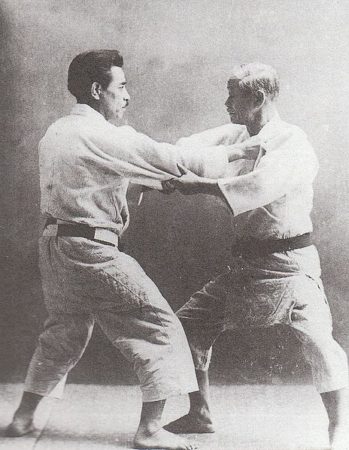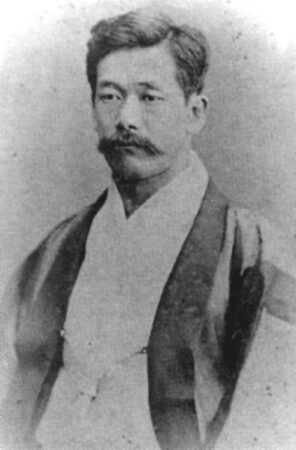How To Spread A Martial Art
3 times over the last 150 miaka, martial artists created more modern versions of older martial arts. Unlike many prior systems, the innovators of these modern martial arts chose to share this information with outsiders and spread their arts around the world.
Jigoro Kano’s dissemination of Judo is the best case study for how to develop and spread a martial art. In 1882, Dk. Kano modified the Ju-Jitsu that he learned into the new art of Judo, the Gentle Way. He taught many students this new form of grappling.

Dk. Jigoro Kano and his student Kyuzo Mifune practicing Judo from the Public Domain
Dk. Kano modified the throws and joint locks of traditional Ju-Jitsu. In the traditional style, you trained with a cooperative partner at a slow pace. If you lost control of a technique, you would hurt your opponent. Dk. Kano took out the dangerous aspects of the techniques, so they could be practiced safely at full speed.
The students sparred with uncooperative partners in realistic circumstances. Training at full speed developed superior skills even with the safer techniques. Students practiced in contests to develop skills and learn which techniques worked for them.
After Dr. Kano trained his students for about seven years, he arranged competitions with other Ju-Jitsu schools. The Tokyo Police Department would hire the winning school to teach their officers self-defense.
Dk. Kano’s students won every match but one, which was a draw. Based on the tournament results, many Ju-Jitsu instructors and students started studying with Dr. Kano. Judo spread quickly through out Japan.
Dk. Kano was always a broad thinker. He envisioned Judo not only spreading through out Japan but through out the world. In the early 20th Century, he began to send out some of his oldest students to disseminate his martial art through out the world. Taekwondo and Brazilian Jiu-Jitsu would employ similar tactics in spreading their art.
By study the development and dissemination of Judo, we can readily identify the steps required to achieve these results.

Dk. Jigoro Kano, the founder of Judo, katika 28 umri wa miaka
Kwanza, you must create an innovative martial art that will stand up to scrutiny from other martial artists. Lots of would be masters have created throw away programs after proclaiming themselves 9th Degree Black Belts.
Pili, you have to train students that have both the talent to master the art and the ability to teach it. Dk. Kano’s students that participated in the tournament had been training with him since the opening of the Kodokan in 1882. He sent these same men to the United States, Europe, etc., when he decided to spread the art outside of Japan.
Tatu, you choose some talented students, who want to start their own schools, to spread the art. These students should be dedicated to the task because it sometimes involves moving to new locations and starting a school with limited helpers. In all three arts cited, teachers moved to foreign countries, where they did not know anyone and had to learn a foreign language.
While the formula is simple, the path is difficult. Even if you have an art worth teaching, it is hard to produce black belts and harder to find teachers. If you can do it though, you can change the world of martial arts at that time.
Pin It
